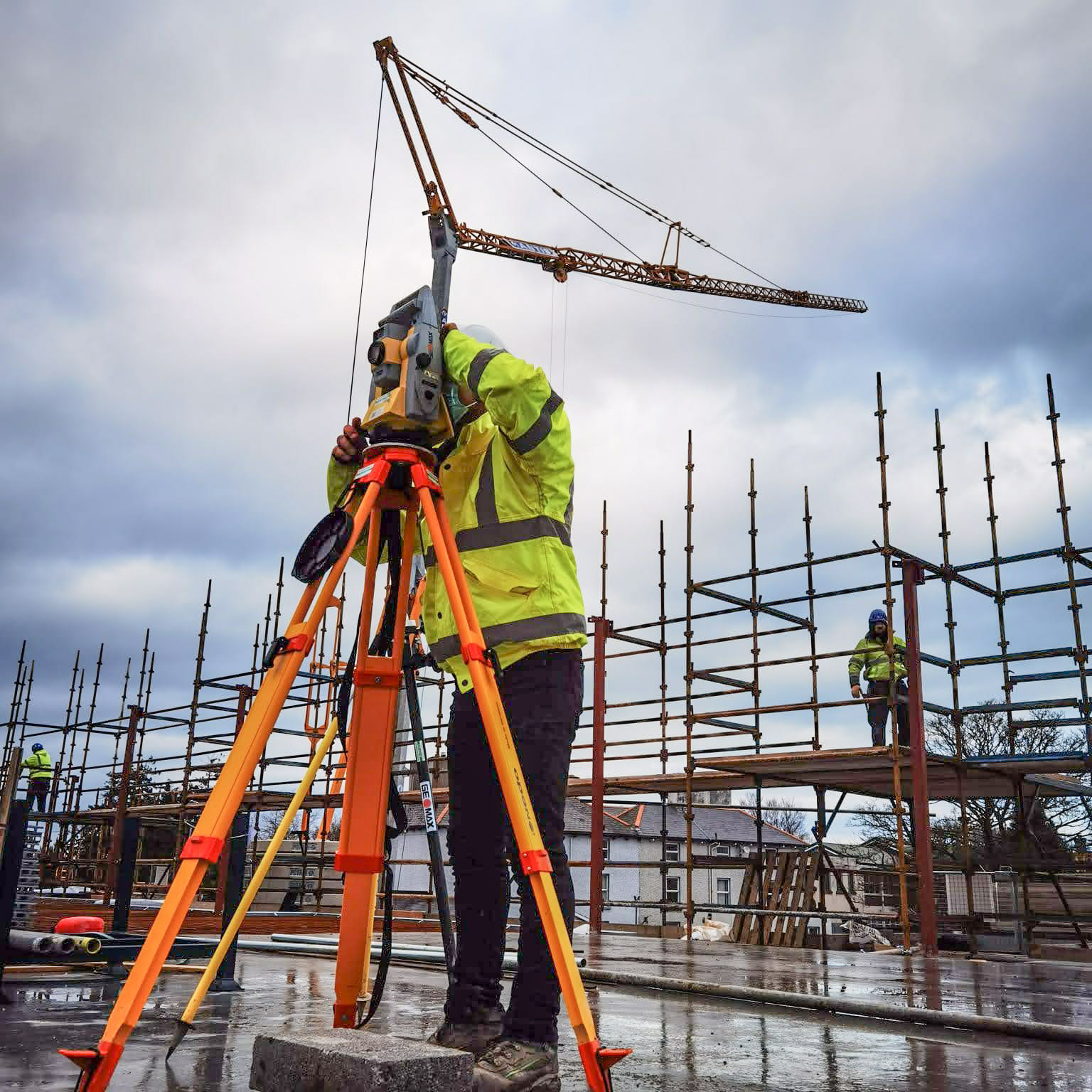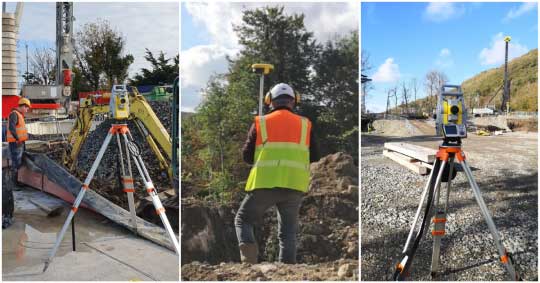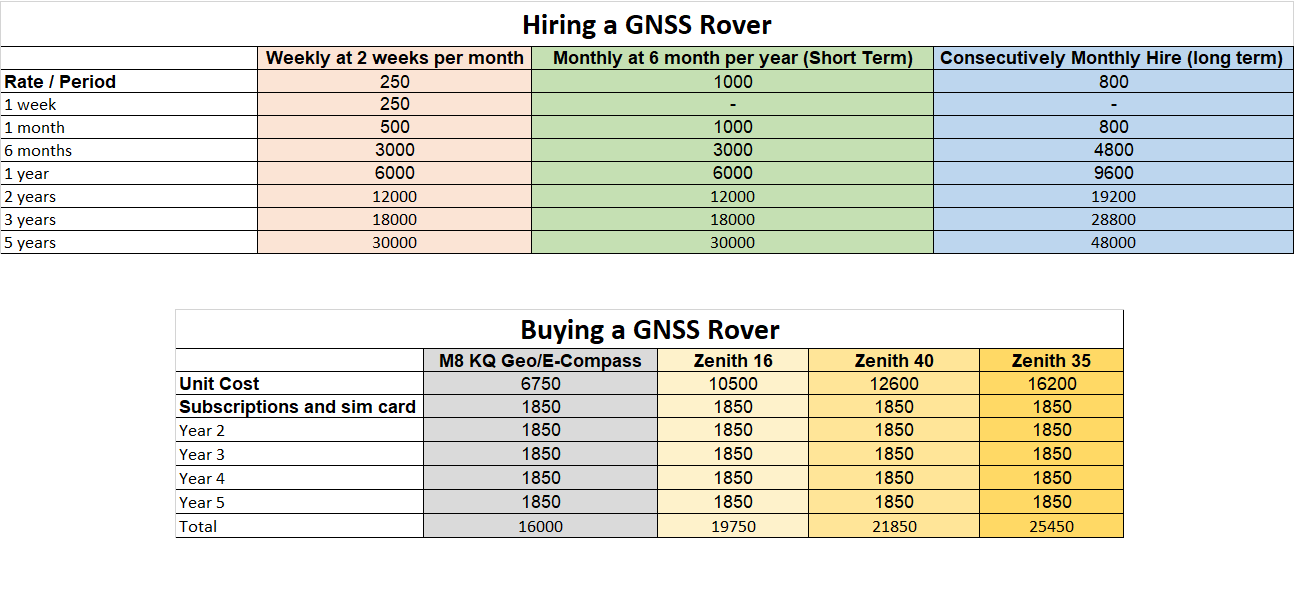The Pros and Cons of Buying vs Renting Surveying Equipment for Your Business
Posted by Philip Hanrahan B.E., B.A., M.I.E.I.; Roch Hanmore B.Sc. on 11th Nov 2020
The decision between buying and renting surveying equipment is a critical one for businesses in construction, engineering, and environmental research. Surveying tools, which include advanced technologies like GPS systems, laser levels, and drones, are indispensable for the accuracy and efficiency they bring to projects. This choice goes beyond a simple financial consideration; it's about aligning with the company's operational needs and strategic goals.
On one hand, buying surveying equipment represents a significant investment in the company's future, promising long-term utility and the assurance of asset ownership. It suggests a commitment to ongoing projects and a readiness to deploy these tools at a moment's notice. Conversely, renting offers unparalleled flexibility and access to the latest technologies without a substantial upfront financial commitment. It allows businesses to adapt to project-specific needs and avoid the depreciation and maintenance concerns associated with ownership.
Each option has its distinct advantages and disadvantages, shaped by factors like the nature and duration of projects, frequency of equipment use, budget limitations, and the rapid pace of technological innovation in surveying instruments.
This article delves into the pros and cons of buying versus renting surveying equipment. Our goal is to provide business owners with a detailed analysis that considers financial implications, operational flexibility, and the strategic positioning of their business. Through this exploration, we aim to equip decision-makers with the insights needed to choose an option that best suits their business's unique circumstances and long-term objectives.
Understanding Surveying Equipment Needs
Before delving into the debate between buying and renting surveying equipment, it's essential to understand the specific needs of your business and the role that such equipment plays in your operations. Surveying equipment encompasses a wide range of tools designed for measuring and mapping the Earth's surface.
These include traditional instruments like theodolites and levels, as well as modern technologies such as GPS (Global Positioning System) devices, laser scanners, and unmanned aerial vehicles (UAVs) or drones. Each tool serves a unique purpose, from establishing property boundaries to constructing buildings and infrastructure, or even conducting environmental and geological surveys.
The decision to buy or rent is significantly influenced by several factors. The frequency of use is a primary consideration; businesses that require surveying equipment on a regular basis may find purchasing more cost-effective in the long run. Conversely, for projects that are short-term or require specialised equipment infrequently, renting may be a more viable option. Budget constraints also play a crucial role, as the high upfront cost of purchasing the latest surveying technology may not be feasible for all businesses. Additionally, the size and scope of projects can dictate the type and amount of equipment needed, further influencing the buy vs. rent decision.
Understanding your business's specific surveying needs, considering the project types you undertake, and evaluating your financial capacity are critical steps in making an informed decision between buying and renting surveying equipment.

The Pros of Buying Surveying Equipment
Investing in surveying equipment by purchasing it outright can offer several advantages to businesses, particularly those with frequent or specialised needs. Here are some of the key benefits:
- Long-term Cost Savings: For businesses that use surveying equipment regularly, buying can be more economical over time. Although the initial investment is significant, owning equipment eliminates ongoing rental fees, providing cost savings in the long run. This is especially true for equipment with a long lifespan and for companies that can maximise its usage across multiple projects.
- Availability and Accessibility: Owning surveying equipment ensures it is available whenever it is needed, without the delays or uncertainties associated with rental availability. This can be crucial for businesses that face tight project deadlines or need to mobilise quickly for unexpected opportunities. The convenience of having equipment on hand can significantly enhance operational efficiency and project turnaround times.
- Customisation and Familiarity: Purchasing equipment allows businesses to select the exact models and specifications that best fit their operational needs and preferences. Over time, users become familiar with their equipment, leading to increased efficiency and reduced errors. This familiarity also allows for Customisation of the equipment setup, optimising it for specific tasks or preferences, which is not always possible with rented gear.
- Resale Value: Surveying equipment, especially well-maintained and high-quality items, can retain significant resale value. Businesses can recoup a portion of their initial investment by selling equipment when it is no longer needed or when upgrading to newer technology. This resale value can offset the cost of future purchases, making the initial investment more palatable.
- No Dependency on Rental Companies: Owning equipment means businesses are not subject to the terms and conditions of rental agreements, which can sometimes include usage restrictions, limited availability, and fluctuating rental rates. Ownership eliminates these concerns, providing businesses with complete control over how and when the equipment is used.
- Tax Advantages: Purchasing surveying equipment can offer tax benefits, such as depreciation deductions and possible incentives for capital investments. These financial advantages can further offset the cost of purchasing equipment, making it a more attractive option for businesses looking to maximise their investment.
Buying surveying equipment offers long-term cost savings, availability, Customisation, potential resale value, independence from rental companies, and tax benefits. These advantages make it a compelling option for businesses with regular and ongoing needs for surveying equipment, providing a solid foundation for operational efficiency and financial planning.
The Cons of Buying Surveying Equipment
While purchasing surveying equipment has its advantages, there are also significant drawbacks that businesses must consider. Here are some of the main cons associated with buying surveying equipment:
- High Initial Investment: The most apparent disadvantage of buying surveying equipment is the substantial upfront cost. Advanced surveying technologies can be expensive, and for small businesses or startups, this initial outlay can strain budgets or divert funds from other critical areas. The high cost can also be a barrier to accessing the latest technology, potentially putting a business at a competitive disadvantage.
- Depreciation and Obsolescence: Surveying equipment, like any technology, depreciates over time. As newer models are released, older equipment can lose value rapidly, both in terms of resale value and operational efficiency. The pace of technological advancement in surveying means equipment can become obsolete quickly, leaving businesses with outdated tools that may not meet the evolving standards of precision and efficiency required for modern projects.
- Maintenance and Repair Costs: Owning surveying equipment means taking on the responsibility for its maintenance and repair. Regular upkeep is necessary to ensure equipment remains accurate and functional, which can incur significant costs over time. Unexpected repairs can also lead to project delays and further expenses, impacting a business's bottom line and operational efficiency.
- Storage and Transportation: Purchased equipment requires proper storage and transportation to and from project sites. This adds logistical considerations and costs, including the need for secure storage facilities and potentially specialised transportation methods to protect sensitive equipment. These additional responsibilities and expenses can add up, especially for businesses with extensive equipment inventories.
- Reduced Flexibility: Buying equipment locks a business into using specific tools for an extended period. This can reduce operational flexibility, making it challenging to adapt to project-specific needs or take advantage of new technologies without additional investment. Renting, on the other hand, allows businesses to choose the most suitable equipment for each project, ensuring they always have access to the best tools for the job.
- Capital Tied Up in Equipment: Funds used to purchase surveying equipment are tied up in physical assets, which may limit a business's ability to invest in other areas, such as marketing, research and development, or expanding the workforce. This can slow growth and reduce a company's agility in responding to market changes or opportunities.
The cons of buying surveying equipment include significant initial costs, the risk of depreciation and obsolescence, ongoing maintenance and repair expenses, storage and transportation challenges, reduced operational flexibility, and capital tied up in physical assets. These factors must be carefully weighed against the benefits of ownership to determine the best approach for each business's unique situation.
The Pros of Renting Surveying Equipment
Renting surveying equipment presents a flexible and often cost-effective alternative to purchasing, especially for businesses with variable project demands or those looking to minimise upfront investments. Here are the key advantages of renting over buying:
- Flexibility and Adaptability: Renting allows businesses to select equipment that is precisely tailored to the requirements of each project. This adaptability is crucial for projects that require specialised tools not frequently used, enabling companies to access the latest technology without the commitment of a purchase. As project needs change, rental agreements can be adjusted accordingly, ensuring the right tools are always at hand.
- Reduced Financial Burden: One of the most significant benefits of renting is the elimination of a large initial investment. Businesses can conserve capital and maintain liquidity by paying for equipment only when it is needed. This can be particularly advantageous for startups or companies with limited budgets, allowing them to allocate resources to other areas such as research, development, and marketing.
- Maintenance and Upkeep: Rental companies typically handle maintenance and repairs, ensuring that equipment is in optimal working condition. This relieves the renting business of the time and expense associated with equipment upkeep. Additionally, if a piece of equipment fails, the rental company is usually responsible for providing a replacement, minimising downtime on projects.
- Access to Latest Technology: Renting offers the opportunity to use the latest surveying equipment without the depreciation concerns associated with ownership. This access ensures that businesses can utilise advanced technology to enhance accuracy and efficiency on projects, staying competitive in their field without the need for continual investment in new equipment.
- No Long-Term Storage Requirements: Without the need to own equipment, businesses avoid the costs and logistics associated with long-term storage. This is particularly beneficial for companies with limited space or those that operate in multiple locations, as it reduces the need for secure storage facilities and the risk of equipment damage during off-use periods.
- Tax Benefits: Rental expenses are often fully deductible as business expenses in the year they are incurred, providing immediate financial benefits. This contrasts with the depreciation deductions associated with purchased equipment, which are spread over several years.
Renting surveying equipment offers flexibility, reduced financial burden, maintenance and repair coverage, access to the latest technology, no long-term storage requirements, and potential tax advantages. These benefits make renting an attractive option for businesses looking to stay agile and efficient in their operations.
The Cons of Renting Surveying Equipment
While renting surveying equipment offers flexibility and financial benefits, there are also drawbacks that businesses need to consider. Here are some of the cons associated with renting:
- Higher Long-term Costs: For businesses that use surveying equipment frequently and over extended periods, renting can become more expensive than buying. The ongoing rental fees can accumulate, making it a less cost-effective option for long-term needs, as opposed to investing in ownership which could pay off over time.
- Availability Issues: Depending on the rental company's inventory and demand, the specific equipment needed for a project may not always be available. This can lead to delays or the need to compromise on the quality or specifications of the equipment, potentially affecting project outcomes.
- Lack of Customisation: Rental equipment often comes in standard configurations that may not perfectly match every project's unique requirements. Businesses may find themselves adjusting their work processes to the equipment available, rather than having equipment tailored to their specific needs.
- Dependency on Rental Company: Renting creates a dependency on the rental company for equipment availability, condition, and timely delivery. Any issues on the rental company's end, such as equipment shortages or logistical delays, can directly impact project timelines and efficiency.
- No Equity Building: Money spent on rentals does not contribute to building asset equity for the business. Unlike purchased equipment, which can be considered a capital investment, rental fees are an expense without residual value, offering no return on investment beyond the rental period.
While renting surveying equipment provides immediate access with lower upfront costs, it may not be the most economical choice for frequent or long-term use. Businesses must weigh these cons against the pros, such as flexibility and access to the latest technology, to determine the best approach for their specific circumstances.
Making the Decision: Factors to Consider
When deciding whether to buy or rent surveying equipment, businesses must weigh several critical factors to align their choice with their operational needs and financial capabilities. Here are key considerations to guide this decision:
- Frequency of Use: Evaluate how often the equipment will be used. Frequent use over multiple projects may justify the initial expense of purchasing, while occasional use may lean towards the benefits of renting.
- Project Duration and Type: Consider the length and type of projects your business undertakes. Short-term or unique projects may benefit from renting specific equipment, whereas long-term projects might make purchasing more cost-effective.
- Budget Constraints: Assess your company's financial health. If capital is limited, renting can preserve cash flow. However, if there's sufficient budget, investing in equipment can save money in the long run. I have calculated a 2 week per month period for a month at hire rates to show you the difference in costs and time in possession of a GNSS Rover.
*All prices exclusive of VAT
**Subscriptions based on 600 hours per year usage
This is also a forecast for how much work you will be undertaking and how much more you can take on to expand your efficiency in surveying.
- Technological Advancement: The rapid pace of technological innovation in surveying equipment should be considered. Renting allows access to the latest technology without the risk of obsolescence, important in industries where precision and efficiency are continually advancing.
- Financial Health and Planning: Beyond immediate costs, consider the impact on your business's financial planning. Purchasing can offer tax benefits through depreciation, while renting expenses are typically fully deductible.
- Support: One of the common questions is regarding the level of support we offer you as a customer.
“Will we get the same level of support once we buy the instrument as the level of support when we hire?”
We’d like to assure you; we are as interested in our customers in purchase as in hire. All our customers get call backs and full support regardless of the system used. Our 360° Support was designed to solve all your issues quickly and efficiently. - Knowledge and Experience: The training for the use of the instrument will have to be complete in hire and sale so no difference here, only that once you learn on one instrument you can only improve on the same instrument. We also notice our trainees are more comfortable using the same equipment they were trained on.
Making an informed decision requires a careful analysis of these factors, ensuring that the choice between renting and buying surveying equipment supports your business's strategic goals, operational efficiency, and financial sustainability.
Case Studies
Case Study 1: High-Tech Engineering Firm
A high-tech engineering firm decided to purchase advanced surveying equipment for their ongoing infrastructure projects. The decision was driven by the frequent use and the need for precision in their work. The investment paid off by enhancing operational efficiency and project accuracy, demonstrating the long-term value of owning equipment for businesses with continuous and specialised needs.
Case Study 2: Small Construction Company
A small construction company opted to rent surveying equipment for a series of short-term projects. This approach allowed them to access the latest technology without a significant upfront investment, effectively managing project costs and adapting to varying project requirements. The flexibility of renting proved ideal for their fluctuating demand and project-specific needs, showcasing the benefits of renting for businesses with diverse and temporary requirements.
Conclusion: Buying vs Renting Surveying
Deciding whether to buy or rent surveying equipment is a strategic choice that impacts a business's financial health and operational efficiency. By carefully considering the pros and cons of each option, businesses can make informed decisions that align with their project needs, budget constraints, and long-term goals, ensuring sustainable success.
For personalised advice on choosing the right surveying equipment for your business, reach out to our experts today.
Further Reading
To deepen your understanding of surveying equipment and its impact on your business decisions, explore the following resources:
- Modern Surveying Techniques: Learn about the latest advancements in surveying technology and how they can benefit your projects. Read more.
- Surveying Equipment Maintenance: Discover best practices for maintaining your surveying equipment to ensure longevity and accuracy. Read more.
---
At Hitechniques we offer both Hire and Sales services and create tailored solutions for construction companies as well as individuals. If you need advice or would like to discuss your options, get in touch with us at info@hitechniques.ie or call 01 257 2323.


